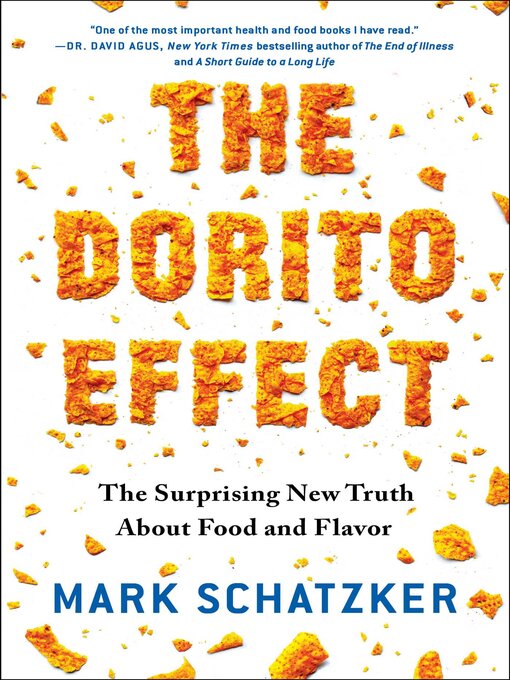- Popular Magazines
- Just Added
- Cooking & Food
- Fashion
- Health & Fitness
- Home & Garden
- News & Politics
- See all magazines collections
The Dorito Effect
How All Food Is Becoming Junk Food—And What We Can Do About It
We are in the grip of a food crisis. Obesity has become a leading cause of preventable death, after only smoking. For nearly half a century we've been trying to pin the blame somewhere—fat, carbs, sugar, wheat, high-fructose corn syrup. But that search has been in vain, because the food problem that's killing us is not a nutrient problem. It's a behavioral problem, and it's caused by the changing flavor of the food we eat.
Ever since the 1940s, with the rise of industrialized food production, we have been gradually leeching the taste out of what we grow. Simultaneously, we have taken great leaps forward in technology, creating a flavor industry, worth billions annually, in an attempt to put back the tastes we've engineered out of our food. The result is a national cuisine that increasingly resembles the paragon of flavor manipulation: Doritos. As food—all food—becomes increasingly bland, we dress it up with calories and flavor chemicals to make it delicious again. We have rewired our palates and our brains, and the results are making us sick and killing us.
With in-depth historical and scientific research, The Dorito Effect casts the food crisis in a fascinating new light, weaving an enthralling tale of how we got to this point and where we are headed. We've been telling ourselves that our addiction to flavor is the problem, but it is actually the solution. We are on the cusp of a new revolution in agriculture that will allow us to eat healthier and live longer by enjoying flavor the way nature intended.
-
Creators
-
Publisher
-
Release date
May 5, 2015 -
Formats
-
Kindle Book
-
OverDrive Read
- ISBN: 9781476724249
- File size: 3200 KB
-
EPUB ebook
- ISBN: 9781476724249
- File size: 3491 KB
-
-
Languages
- English
-
Reviews
-
Library Journal
May 1, 2015
Schatzker (Steak: One Man's Search for the World's Tastiest Piece of Beef) here examines the state of the American food industry and its role in the rising obesity epidemic. He contends that foods such as tomatoes are losing flavor owing to modern agricultural practices; meanwhile, "things" such as chips and fast food have become highly flavored to taste more appealing. Schatzker traces the development of Big Flavor beginning with the birth of the Dorito and the development of flavor technology. The second half of the book is heavy on scientific information, focusing on numerous studies of eating, nutrition, and flavor. Schatzker makes his case for curing this problem by seeking out several foods that were specifically cultivated for their taste. He encourages readers to eat fewer flavored "things" and seek out tastier varieties of real foods. VERDICT While readers may get bogged down in the lengthy discussion of scientific studies, the discussion of the development of flavor technology will be of interest to those who enjoyed Michael Moss's Salt Sugar Fat: How the Food Giants Hooked Us.--Melissa Stoeger, Deerfield P.L., IL
Copyright 2015 Library Journal, LLC Used with permission.
-
Booklist
Starred review from May 1, 2015
Sugars, carbs, and fats have been repeatedly identified as villains in America's present-day battle with obesity, but investigative journalist Schatzker calls them only a very small part of a larger issue. Industrial agriculture may have brought lots of cheap food to America's tables, but way too much of it lacks flavor and full nutrition. To offer eaters something beyond bland, chefs have to brine today's birds and pour on a cabinetful of spices and herbs. Meticulously analyzing current research involving diverse subjects such as urine-eating goats and caterpillar-consuming wasps, Schatzker casts the greatest share of blame for obesity on the ubiquity of artificial flavorings, which deceive the palate, distort natural curbs on appetite, and provoke overconsumption of nutritionally deficient food. Fortunately for American consumers, there is hope: farmers are returning to heirloom breeds of chickens and pigs and to older cultivars of plants in order to give foods the flavors their grandparents relished. This is a provocative new take on American eating.(Reprinted with permission of Booklist, copyright 2015, American Library Association.)
-
Formats
- Kindle Book
- OverDrive Read
- EPUB ebook
subjects
Languages
- English
Loading
Why is availability limited?
×Availability can change throughout the month based on the library's budget. You can still place a hold on the title, and your hold will be automatically filled as soon as the title is available again.
The Kindle Book format for this title is not supported on:
×Read-along ebook
×The OverDrive Read format of this ebook has professional narration that plays while you read in your browser. Learn more here.


